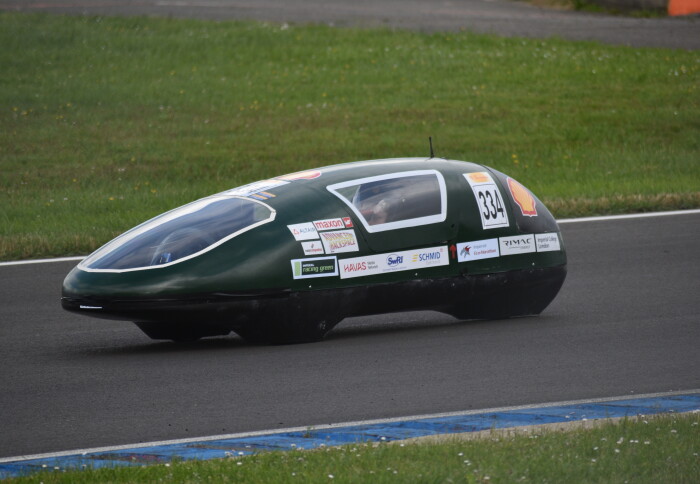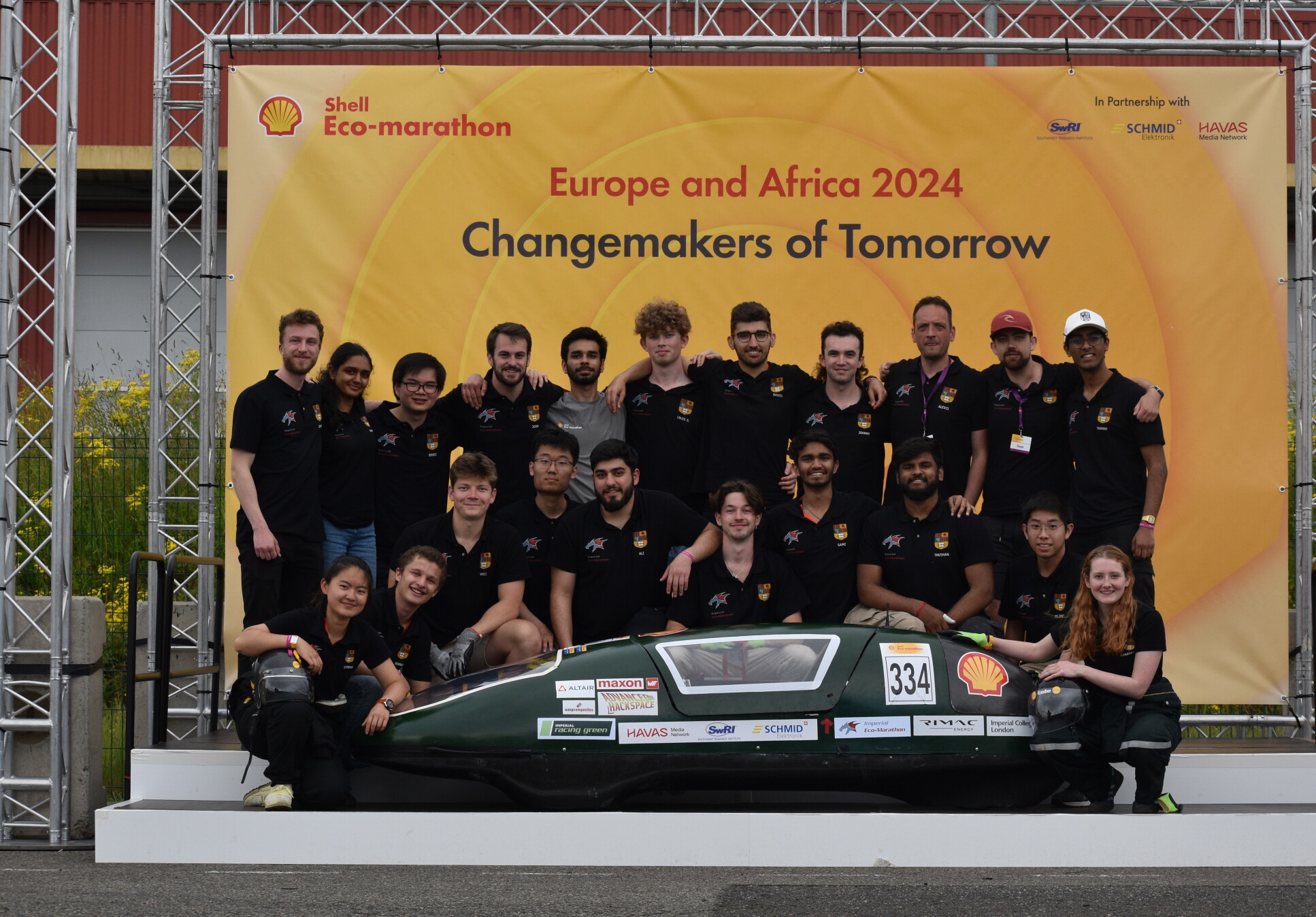Imperial students design winning prototype vehicle in race for energy-efficiency

The prototype vehicle during the fourth attempt in the competition
The Imperial Eco-Marathon team had their best year yet at the Shell Eco-marathon race, competing against student teams from across Europe and Africa.
Their battery-electric prototype vehicle won first prize for the simulation and design work, second place for data and telemetry and thirteenth most energy-efficient in their competition category.
On a crisp spring day in southern France, over 1,200 excited student hopefuls from Across Europe and Africa were gathered at the “Circuit Paul Armagnac” racing track to compete in the prestigious Shell Eco-Marathon. Amongst them were nineteen of our very own Imperial students, preparing their prototype vehicle to race. The goal: through precise engineering, innovation in design and months of planning, building and testing, to drive their vehicle around the circuit using the least amount of energy possible.
Shell Eco-Marathon is an annual competition that challenges student teams from around the world to design, build, and drive energy-efficient vehicles. The primary goal is to see how far a vehicle can travel on the least amount of energy. Vehicles are evaluated on safety, adherence to technical regulations, and design innovation before reaching the racing stage. Then each team's vehicle undergoes a series of test runs on a closed track, and the best performance is recorded.

Building on the last six years of experience in motorsports projects, the Imperial Eco-Marathon team have worked through the year to build a light and highly efficient prototype vehicle. The team is led by Team Principal Daniel Gutierrez in third year Aeronautical Engineering, and Chief Engineer Annamaria McHugh in fourth year Mechanical Engineering. Annamaria is also the primary driver, and battery team lead Simeng Li, first year PhD in physics, as the reserve driver. During the competition, one of the drivers commands the vehicle around the track to a precise strategy of speed, steer and route to optimise the efficiency of the vehicle.
Each year the team goes back to the drawing board, assesses the success and failures of the last iteration and builds on last year's design. “This year we had so many improvements across the car, that it may as well be called a new one. We improved the whole drivetrain architecture, from mountings to the battery, motor and gear, our tires and our steering too! The only major component that remained from last year is the top half of the shell”, said Louis Gillick, a third year Mechanical Engineering student.
After passing 120 inspection tests, the team completed a number of runs around the track with a best lap of 529.9 km/kWh. This put the Imperial team at a ranking of thirteenth most efficient in their category of Battery-Electric prototype vehicles. The team also won two off-track awards:
- First prize in the “Simulate to Innovate” competition, which assesses the use of simulation software, such as Final Element Analysis (FEA), to conceive, simulate, and finalise a design that is demonstrably lighter weight yet strong enough to survive the competition. The Imperial submission was written by Louis, on the topic of Optimisation of a Steering Upright.
- Second place in the “Data and Telemetry” prize which recognises the team's competitive edge on track by leveraging insights from race data to influence the driving strategy. The submission was written by Charalampos Charalampous, second year Mechanical Engineering student.

The Imperial Eco-Marathon team consists of 50 students from several departments, including Mechanical Engineering, Electrical and Electronic Engineering and Aeronautical Engineering. These students are bond by their common interests in automotives and exploring the limits in engineering, without any degree credits. They are split into eight specialist units, each responsible for a different component of the car and collaborating with the rest of the team to ensure their component is optimised and contributing to the overall objectives.
The team also contributes three “Design, Make and Test” (DMT) projects for third year Mechanical Engineering students. They work closely with the society team to develop the vehicle together. For example, Sami Haque from the wheels, brakes and rear frame DMT says: “In my work on the rear frame, I had to be in constant contact with the Drivetrain team, to ensure all components combine together with adjustability and minimal defection. That also required our rear frame to work with the monocoque.”
The students involved in the project have experienced huge benefits. Chief among them is the opportunity to apply what they have learnt in class in a real-world setting. The project encourages them to work as a team to solve problems and learn to collaborate and communicate. Damini Vecaria, third year Mechanical Engineering student in the DMT group, commented: “Just talking to others across the team, making sure things overlap and fit together - that is definitely the hardest bit but most useful. And it’s also nice to come here and see the vehicle work.”
Many students from Imperial Eco-Marathon have been able to use their experiences to help them establish their career after Imperial. James Chadwick, Mechanical Engineering graduate, has been involved with the society for three years, first as a DMT student but now in a new capacity: “I started with the Imperial Eco-Marathon team in my third year as a student designing the steering for my DMT project. Then last year I took on the Chief Engineer role, a leadership role to get a different side of the society. My involvement with the Imperial Eco-Marathon team definitely helped to secure my new role. As an extracurricular activity, it’s great, it puts you in a lot of new situations and experiences.” Since graduating he has started working as the Mechanical Integration Engineer at Rimac Energy and has encouraged the company to sponsor the Imperial Eco-Marathon team: “They were keen to get involved in a project that promotes energy-efficiency and positive values around the society and competition.”

The positive impact of the project is also noticed by faculty members. Dr Alexis Ihracska is one of the Imperial staff that oversees this extracurricular project, ensuring health and safety standards, managing procurement and offering technical advice to the team. He commented: “It’s just obvious in the fourth year, you can see who are the students who were involved in this project. They are so much more confident, they manage their final year projects and academic assignments so much better. They learn what they can actually deal with, these competitions really test them to their limits. It’s good for academic development, soft skills, and learning how to work together as a team. They have to come here, argue, get things done, set their own deadlines and miss their own deadlines as well. There is a learning curve that cannot be replicated in any other way.”
The Imperial Eco-Marathon team is already looking towards Shell Eco-marathon 2025. Joan Garcia Boix, MSc Advanced Aeronautical Engineering student has started working towards next year: “I was given a blank piece of paper and told, be ambitious as you want, make a design for next year. We want to feed whatever we have in this year's car into next year's car. We are reviewing the data [from this year's race] and we are trying to get a strategy to optimise the energy based on what we see on track.”
As we reflect on the successes of Shell Eco-marathon 2024, it underscores the potential to drive meaningful change in energy-efficient transport and lead the way towards a more sustainable future. Through creativity, perseverance, and a collective commitment to energy efficiency, the students of Imperial College London can proudly be at the forefront of this transformative journey.
Article by Keeren Flora, Imperial alumni, Science Communication MSc
Article text (excluding photos or graphics) © Imperial College London.
Photos and graphics subject to third party copyright used with permission or © Imperial College London.
Reporter
Press Office
Communications and Public Affairs
- Email: press.office@imperial.ac.uk
